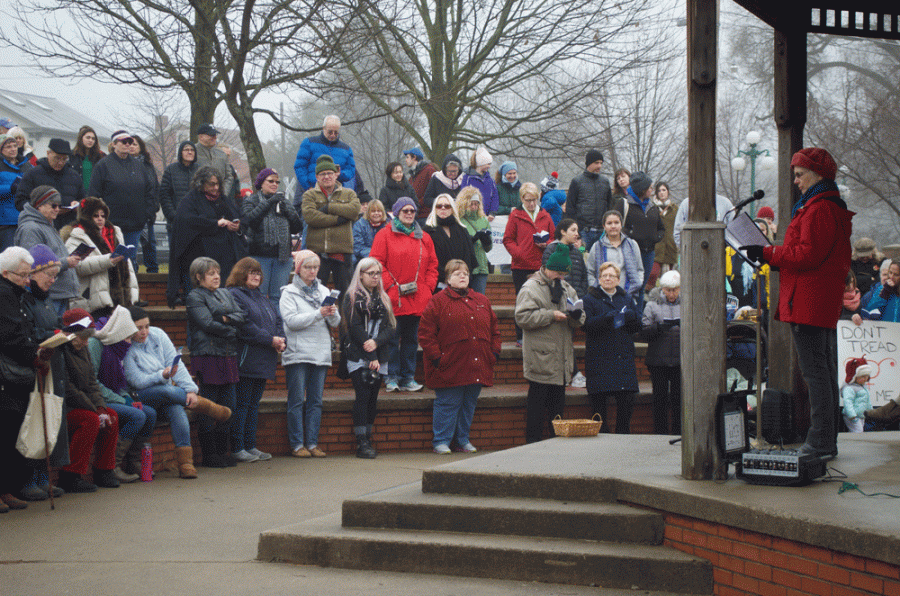Students, staff, faculty partake in celebrations and protests surrounding inauguration of Donald Trump
January 26, 2017
Over the course of Jan. 20 and 21, University students, faculty, and staff exercised their varying forms of patriotism and activism by attending either the inauguration of President Donald Trump, the Women’s March on Washington, a rally in Hufnagle Park, or any combination thereof.
Associate Professor of Political Science Chris Ellis and Associate Professor of English and Department Chair Alf Siewers attended the inauguration on Jan. 20 with University students.
“I was mostly struck by how orderly and civil everything was… for the most part, Trump supporters, protestors, and people just out to see the show were sharing the same space and making their views known calmly and peacefully,” associate professor of political science Chris Ellis said.
Numerous on-campus groups sponsored buses for 155 students, staff, and faculty to join the 400,000 marchers gathered in Washington, according to Carmen Gillespie, professor of English and director of the Griot Institute of Africana Studies. The buses to Washington were sponsored by the Griot Institute, the Bucknell Institute for Public Policy, and the department of women and gender studies, and co-sponsored by Kathleen McQuiston, Janice Mann, and the departments of Latin American studies, geography, art & art history, philosophy, physics & astronomy, and managing for sustainability.
“As an academic community, and as articulated in our mission statement, we encourage Bucknellians, particularly our students, ‘to serve the common good and to promote justice in ways sensitive to the moral and ethical dimensions of life,’” Gillespie said. “The Women’s March was a perfect opportunity for our community to participate in that essential work with a larger constituency,” Gillespie said.
Pictures of the large crowds and unique signs have been shared across news outlets and social media, but students and faculty who attended the event were overwhelmed by the respectful atmosphere and powerful messages that marchers were sending.
“A moment that touched me was when the crowd was shouting ‘Black Lives Matter,’ and people went up to a police officer and put their arms around him and said ‘you are part of it.’ Then, a moment later, someone touched his uniform and said ‘this matters too.’ The officer embraced the crowd,” Director of Campus Activities and Student Organizations Mike Duignan said.
“The atmosphere in D.C. was phenomenal—people going to the march were literally everywhere, and the Metro was packed with a Tokyo-like density of people. There was singing and chanting, and it all went off very peacefully and in a friendly way,” Associate Professor of Comparative Humanities John Hunter said.
Despite the large focus on women’s rights, the march was open to those of any gender identity and welcomed support for any marginalized people.
“I was struck by the congeniality, patience, and camaraderie of those attending the march. It was so incredibly crowded, yet people were kind, generous, and empathetic,” Gillespie said.
In Lewisburg, local organizations planned a peace gathering in Hufnagle Park titled, “We the People: Rally in the Valley” on Jan. 21 where students and community members gathered together. The event was organized by the Unitarian Universalist Congregation of the Susquehanna Valley, as well as Temple Beth-El, the Sunbury Islamic Center, and additional Christian congregations.
“[The rally] was definitely something that brought the community together and was a support system to show everyone there that we have a unified body of people who feel the same way as you,” Rachel Cincotta ’17 said.
The Constitution was read twice to the crowd to remind gatherers of rights they have in common; students were impressed by the calming and unifying nature of the gathering.
“It was important for education purposes … it was eye-opening to be like, ‘we’re supposed to have these rights but they are not being followed,’” Libby Seidell ’17 said.
“It was a recognition and remembrance that these are the words our country was founded upon … [Trump] can’t skirt around these things. These are our rights and he can’t take them away from us,” Julia Friedman ’17 said.
Students also used the events as an opportunity to express their current concerns and opinions with recent political changes.
“I do hope that after this march [Trump] will come to realize that the majority of this country will not stand idly by if he attempts to bring any form of harm to minorities or women in this country,” Alex Katz ’17 said.
“Your rights to your own body are so important and need to be respected. It’s tremendously scary to realize that someone is in office who doesn’t necessarily respect me as a woman,” Emma Benson-Xu ’17, a Hillary Clinton campaign fellow for Union County, said.
Students are also hoping that the University community will continue support of the movement, and that events such as the Hufnagle Park rally can be better communicated so students can become more involved in the Lewisburg community.
“Historically, in times of crisis … student activism has been a crucial force for social change … attending marches like this might give our Bucknell students the motivation to move forward with active hope to work toward creating a real democracy in our republic,” Professor of Management Tammy Hiller said.
“I think the best thing after the march … is to continue to be proactive, to continue to talk about it … people need to start realizing that their voice matters,” Benson-Xu said.
Regardless of political affiliation, the widespread participation in both the inauguration and subsequent marches and rallies both locally and otherwise reflects a vested interest in the future of our country, one that is irrefutably vital to democracy.






















